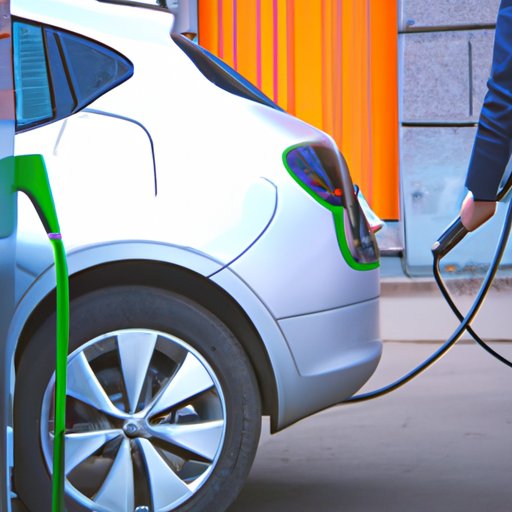Introduction
Electric cars are becoming increasingly popular, with many people opting for this eco-friendly transportation option in an effort to reduce their carbon footprint. One of the main considerations for potential electric car owners is how much it will cost to charge their vehicle at home. This article explores the various costs associated with home electric car charging, as well as the pros and cons and what to consider when selecting the best option.

Exploring the Costs of Home Electric Car Charging
The cost of home electric car charging depends on several factors, including the initial cost of installation, the cost of electricity used, and any maintenance or repair costs that may be incurred. Let’s take a closer look at each of these.
Initial Cost of Installation
The first cost to consider is the initial installation fee for your home electric car charger. The exact cost of installation will vary depending on the type of charger you choose and the complexity of the installation. Generally speaking, most installations will cost between $500 and $1,500, although some may be more expensive. It’s important to research different suppliers to find the best deal.
Cost of Electricity
The next cost to consider is the price of electricity used to charge your electric car. This can vary significantly depending on where you live, so it’s important to do your research and compare prices across different suppliers. In general, the cost of electricity used to charge an electric car will range from around $0.05 per kilowatt hour (kWh) to $0.30 per kWh.
Maintenance and Repair Costs
Finally, you should factor in any maintenance or repair costs associated with your home electric car charging station. Most chargers come with a warranty, but it’s still important to keep an eye out for any potential issues and have them addressed promptly to avoid any costly repairs down the line.

Comparing Home Electric Car Charging Prices
When it comes to choosing a home electric car charging station, one of the most important factors to consider is the price. Different suppliers offer varying prices for their chargers and services, so it’s important to do your research and compare prices before making a decision. In addition to comparing prices between different suppliers, it’s also important to compare the different types of chargers available. For example, a Level 2 charger is typically more expensive than a Level 1 charger, but it can charge an electric car much faster.
The Pros & Cons of Home Electric Car Charging
It’s important to weigh up the pros and cons of home electric car charging before making a decision. On the plus side, home charging offers convenience and flexibility. You don’t need to worry about finding a public charging station, and you can charge your car whenever you want. On the downside, home charging can be expensive, and it may require additional wiring or construction work to install a charger in your home.
What to Consider When Charging Electric Cars at Home
When it comes to home electric car charging, there are several important factors to consider. First, you need to decide which type of charger you need. There are three main types of chargers: Level 1, Level 2, and DC fast chargers. Each type has its own advantages and disadvantages, so it’s important to do your research and choose the one that best suits your needs. Second, you need to decide where to install the charger. This will depend on the layout of your home and your personal preference. Finally, you need to consider how your charger will be connected to the power grid. Depending on your location, this may require additional wiring or construction work.

Understanding the Cost of Home Electric Car Charging
Now that we’ve explored the various costs associated with home electric car charging, let’s take a closer look at how these costs are calculated. The cost of electricity used to charge an electric car will vary depending on where you live and the type of charger you use. The cost of installation will depend on the complexity of the installation and the type of charger you choose. Finally, the cost of maintenance and repairs will depend on the quality of the charger and how often it needs to be serviced.
How to Choose the Best Home Electric Car Charging Option
When it comes to choosing the best home electric car charging option, there are a few things to consider. First, you need to think about your own needs. Do you need a Level 1, Level 2, or DC fast charger? How often will you be using the charger? Where do you plan to install it? Once you’ve answered these questions, the next step is to do your research. Look at different suppliers and compare prices and services. Finally, make sure to read reviews and get advice from friends and family before making a decision.
Conclusion
Charging electric cars at home can be a convenient and cost-effective way to power your vehicle. However, it’s important to understand the various costs associated with home electric car charging, from installation to ongoing maintenance and repairs. By researching different suppliers, comparing prices and services, and considering your own needs, you can ensure you choose the best home electric car charging option for you.
(Note: Is this article not meeting your expectations? Do you have knowledge or insights to share? Unlock new opportunities and expand your reach by joining our authors team. Click Registration to join us and share your expertise with our readers.)
